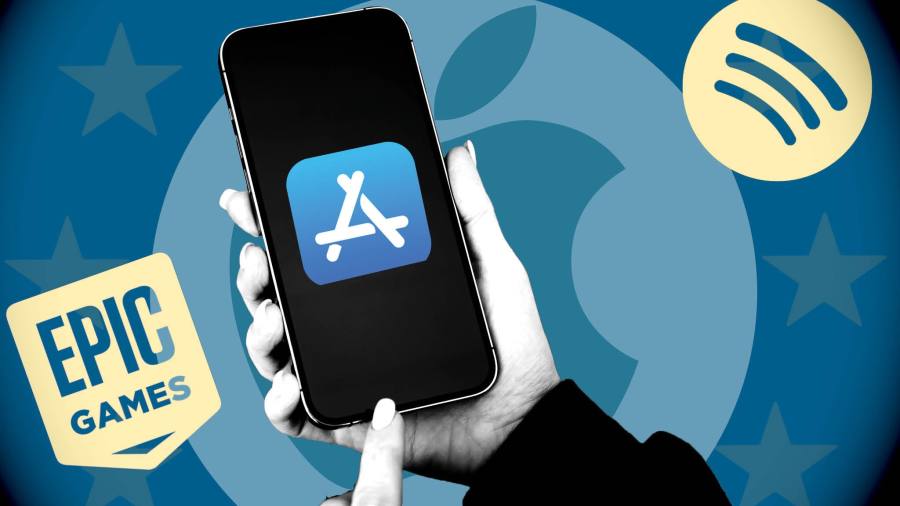
Apple is laying the groundwork to comply with tough new EU rules that will allow iPhone users to pick apps from beyond its own App Store, as developers seek to skirt the up to 30 per cent fee imposed by the US tech giant.
The move comes in response to the EU’s Digital Markets Act, which passed into law last month and is part of the biggest overhaul of laws governing the world’s largest technology companies in more than two decades.
The DMA, which will not be enforced until March 2024, represents the biggest threat to Apple’s control over its closed operating system in the past 15 years.
EU officials believe Apple will be disproportionately hit by the new rules. “They are in a situation where it will not be simple for them to escape,” said a person directly involved in the drafting of the rules, adding that it could potentially knock off billions of dollars in revenues every year.
Apple has been fighting to keep all app downloads and payments inside the App Store for years, arguing that its “curation” process was critical to user safety. It has faced sustained criticism and legal challenges from app developers, including Fortnite maker Epic Games and music service Spotify.
The US tech giant has set up teams dedicated to complying with Brussels’ new legislation, but it is working out the details as it interprets what the sweeping laws entail, according to people familiar with the matter. The move was first reported by Bloomberg. Apple declined to comment.
“This is big and it’s very necessary for innovation,” said Nicolas Rieul, chair of IAB Europe, an advertising association that believes Apple is abusing its power.
Europe, a market with 450mn smartphone users, is Apple’s second-largest after the Americas, worth $95bn. The EU has warned that “repeated infringements” of its DMA legislation could result in penalties of up to 20 per cent of global revenue. In Apple’s case, that would be $80bn.
Nicholas Rodelli of CFRA Research said Apple’s global operating profits could see a “massive” 15 per cent hit from the DMA, pointing out that the EU was serious about enforcing rules designed to generate more competition.
Apple is expected to look for ways in which it can limit changes.
The EU’s rules state that “gatekeepers” — large online platforms — “shall allow and technically enable the installation and effective use of third-party software applications or software application stores”.
The “or” could give Apple wriggle room to offer so-called sideloading — where users install software through a browser — but not rival app stores.
Another part of the DMA that would affect Apple’s business is the requirement to allow developers to install third-party payment systems, rather than being forced to use Apple’s.
One of the biggest questions is whether Apple will charge its usual 15-30 per cent fee on apps installed outside of the App Store.
Rodelli said Apple was likely to take “a minimalist approach”, complying only where it must but using security loopholes to keep the iPhone as locked down as possible.
Apple has previously made it clear that it would fight for what it considered to be rightful intellectual property payments.
In its Epic Games trial last year, Apple chief executive Tim Cook said the 15-30 per cent “in-app purchase” (IAP) charge was not merely a payment processing fee but a wider commission for Apple-made tools and customer service.
“If not for IAP, we would have to come up with another system to invoice developers, which . . . I think would be a mess,” said Cook.
Apple’s run-in with the Dutch competition authority over the past year provides an insight into how the company’s regulatory playbook might apply to the DMA.
Last December, Dutch regulators told Apple that preventing dating apps from using alternative payment systems was “unreasonable”. It gave the tech giant two months to allow consumers to pay outside the App Store.
Apple complied after initially paying €50mn in fines for missing the Netherlands Authority for Consumers and Markets’ deadline. However, it replaced its 30 per cent commission with a 27 per cent fee, leaving only up to 3 percentage points of additional revenue for the developer, out of which fees for payment processing would also have to be paid.
Apple also required pop-up messages warning the user they would “no longer be transacting with Apple”. Early drafts included the caution that “only purchases through the App Store are secured by Apple”, which critics saw as an attempt to dissuade users from leaving Apple’s platform and was only changed after pressure from the Dutch authorities.
Many in the industry expect Apple — which has a history of being highly litigious — to try to challenge some aspects of the DMA through the courts.
EU regulators point to it as the company with some of the most aggressive lawyers seeking to derail or water down the rules. This has led to confrontations between the European Commission and Apple over how the new rules need to be implemented, said a senior EU official.
“I do expect litigation and disputes around the implementation details. Maybe Apple doesn’t challenge the legislation itself, but they could challenge, for example, what it means to have reasonable security measures in place,” said Rodelli.
Apple requires additional safeguards on the iPhone because a compromised device could give access to a user’s location throughout the day as well as highly personal health or financial information.
Even if Apple does allow for third-party app stores, Morgan Stanley analyst Erik Woodring expects hardly anyone would use them.
He called any potential overhaul “more bark than bite”, adding that Apple customers enjoyed the “security, centralisation and convenience that the App Store brings” and estimating a worst-case scenario revenue hit of just 1 per cent.
Another option could see Apple fully comply with Brussels’ rules but opt to introduce fees in apps that currently pay nothing, such as banking apps or ride-hailing services.
Others suggest that Apple may choose to cut all its fees to 10 or 15 per cent if EU enforcement is draconian.
Such a move could thwart any nascent competition from alternative app stores and even bring in new sources of revenue from the likes of Spotify and Netflix, big apps where consumers can sign up and pay on the web.
Both streaming groups abandoned in-app purchases on Apple because they consider the fee egregious, but Ben Bajarin at research group Creative Strategies said 10-15 per cent could be more tolerable if it results in higher traffic.
“That’s money Apple never would have had,” said Bajarin. “You could argue they might actually make more money than they are taking from those cuts.”
<!-- -->- SEO Powered Content & PR Distribution. Get Amplified Today.
- Platoblockchain. Web3 Metaverse Intelligence. Knowledge Amplified. Access Here.
- Source: https://blockchainconsultants.io/apple-moves-to-open-up-app-store-as-tough-eu-laws-loom/?utm_source=rss&utm_medium=rss&utm_campaign=apple-moves-to-open-up-app-store-as-tough-eu-laws-loom
- 1
- 10
- 15 years
- 2024
- a
- About
- access
- According
- actually
- Additional
- Advertising
- affect
- After
- aggressive
- All
- alternative
- Americas
- analyst
- and
- Another
- anyone
- app
- app store
- Apple
- Application
- applications
- Apply
- apps
- argue
- around
- aspects
- Association
- Authorities
- authority
- Banking
- banking apps
- because
- being
- believe
- believes
- between
- Beyond
- Big
- Biggest
- billions
- Bloomberg
- bring
- browser
- business
- called
- case
- Chair
- challenge
- challenges
- Changes
- charge
- chief
- Choose
- clear
- closed
- come
- comment
- commission
- Companies
- company
- Company’s
- competition
- Compromised
- Consider
- considered
- Consumers
- control
- convenience
- could
- Courts
- Creative
- critical
- Critics
- Currently
- customer
- Customer Service
- Customers
- Cut
- cuts
- Dating
- day
- dc
- decades
- December
- dedicated
- description
- designed
- details
- Developer
- developers
- device
- directly
- disputes
- dissuade
- dma
- Doesn’t
- dollars
- down
- downloads
- Dutch
- Early
- Effective
- enable
- enforcement
- EPIC
- Epic Games
- EU
- Europe
- European
- european commission
- Even
- example
- executive
- expect
- expected
- expects
- faced
- familiar
- fee
- Fees
- fight
- fighting
- financial
- fines
- First
- For Consumers
- from
- FT
- fully
- Games
- generate
- giant
- Give
- Global
- groundwork
- Group
- Group’s
- Health
- higher
- highly
- history
- Hit
- How
- However
- HTTPS
- implementation
- implemented
- imposed
- in
- included
- Including
- industry
- information
- initially
- Innovation
- insight
- install
- intellectual
- intellectual property
- introduce
- involved
- iPhone
- IT
- itself
- Keep
- large
- largest
- Last
- Last Year
- Law
- Laws
- Lawyers
- leaving
- Led
- Legal
- Legislation
- likely
- LIMIT
- LINK
- Litigation
- location
- locked
- longer
- Look
- loopholes
- made
- make
- maker
- March
- March 2024
- Market
- Markets
- Matter
- means
- measures
- merely
- messages
- might
- missing
- money
- Month
- months
- more
- Morgan
- morgan stanley
- most
- move
- moves
- Music
- nascent
- necessary
- Need
- Netflix
- Netherlands
- New
- New Legislation
- Nicolas
- offer
- official
- online
- online platforms
- open
- operating
- operating system
- Option
- outside
- Overhaul
- own
- paid
- part
- passed
- past
- Pay
- paying
- payment
- payment processing
- Payment Systems
- payments
- People
- percentage
- person
- personal
- pick
- Place
- platform
- Platforms
- plato
- Plato Data Intelligence
- PlatoData
- Point
- points
- pop-up
- possible
- potential
- potentially
- power
- pressure
- preventing
- previously
- process
- processing
- profits
- property
- provides
- purchases
- Questions
- reasonable
- Regulators
- regulatory
- replaced
- Reported
- represents
- required
- requirement
- requires
- research
- response
- result
- Results
- revenue
- revenues
- Rival
- Room
- rules
- Safety
- Said
- second-largest
- Secured
- security
- Seek
- seeking
- serious
- service
- Services
- set
- sideloading
- sign
- Simple
- situation
- smartphone
- Software
- some
- Sources
- Spotify
- stanley
- State
- store
- stores
- strategies
- streaming
- such
- system
- Systems
- Take
- taking
- teams
- tech
- Technology
- technology companies
- The
- the Netherlands
- third-party
- threat
- Through
- throughout
- to
- tools
- traffic
- transacting
- trial
- us
- use
- User
- users
- W3
- warning
- Water
- ways
- web
- What
- whether
- which
- wider
- will
- working
- working out
- world’s
- worth
- would
- year
- years
- zephyrnet











